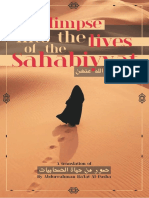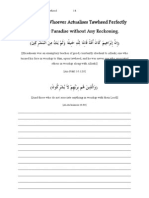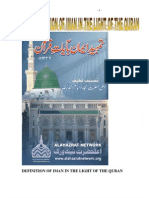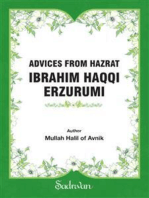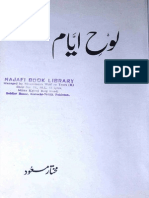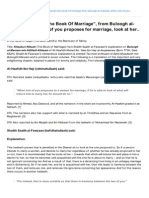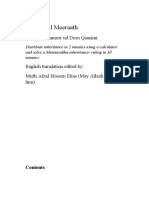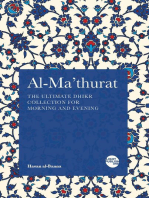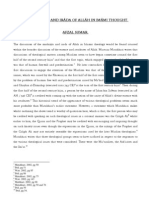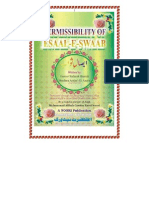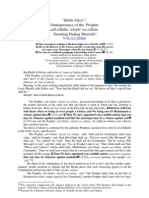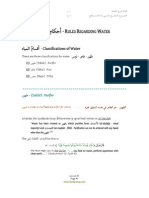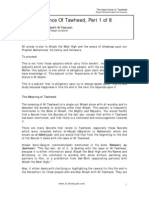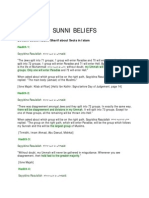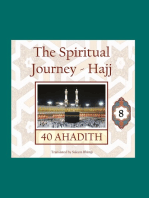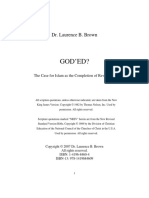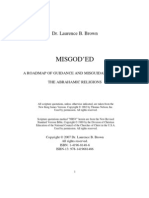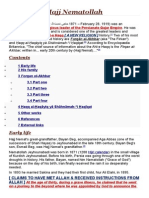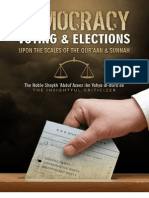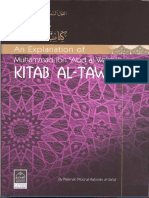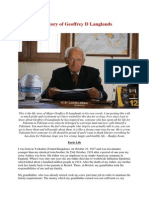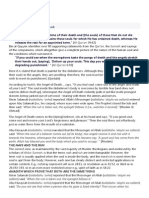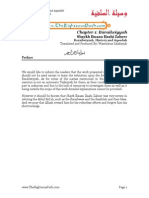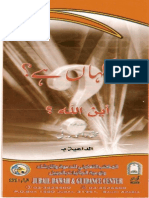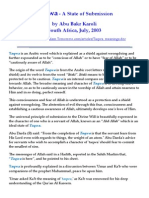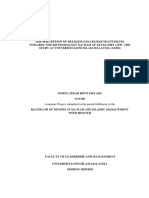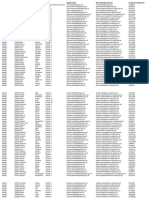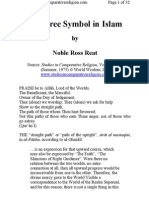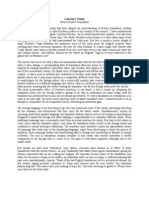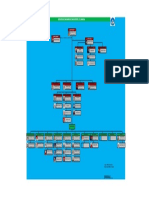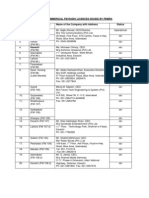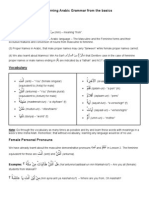Waseela (Intercession) - in The Light of Quran and Sunnah
Uploaded by
Ibn SadiqWaseela (Intercession) - in The Light of Quran and Sunnah
Uploaded by
Ibn SadiqWASEELA (INTERCESSION) IN THE LIGHT OF QURAN AND SUNNAH Image Posted by Mohammed Ilyas Mir on July 14, 2012
12 4 Comments
Compiled by: Mohammad Omar Shah Every Muslim knows that Allah had sent some extraordinary personalities at different times in this world including Prophets, Sahabas, tabain, tabe tabain, mujtahideen, muhaditheen, awliyas of Allah etc. Nobody can deny their efforts for Islam and challenge their status and taqwa. The intention of this document is to help explain and understand the proper and valid concept of waseela in the light of Quran and teachings of the prophet (Peace be upon him). Please note that this is simply a message from one Muslim to another with the sole purpose of spreading the message of Islam in the light of Quran and Sunnah and not to infringe the interests of any individual. I seek protection in Allah from the accursed Shaitaan. I begin in the name of Allah the most gracious, the most merciful. May Allahs peace and blessings be upon the Messenger (s.a.w), his family, his companions and those who followed them in their path. All truth and good is from Allah. All the mistakes are mine. WASEELA (OR TAWASSUL IN ARABIC) The Quranic term Waseela can be defined in one word as means. As per the Islamic understanding, this (waseela) is an action or practice through which a Muslim seeks nearness to Allah. In the modern (especially the South Asian) world, people have taken the word waseela to mean something completely contradictory to the Quranic understanding of it. in laymen language, waseela can be defined as a path to contact Allah or a means through which ones dua is accepted quickly. Unfortunately many have misunderstood and misinterpreted this definition in a way which the shariah doesnt allow. We will be discussing this in brief. TYPES OF WASEELA ACCORDING TO THE ISLAMIC UNDERSTANDING
They can be broadly classified into two types 1. Correct/permissible Islamic Waseela 2. Incorrect/impermissible Islamic Waseela PERMISSIBLE WASEELA IN BRIEF This means seeking to draw close to Allah through acts of worship which He loves and which pleases Him; these may be waajib (obligatory) or mustahabb (encouraged) and may take the form of words, actions or beliefs.These forms are studied and derived from the Quran, Sunnah and religious practices of the righteous predecessors [1st three generations which include the companions of the Prophet (peace be upon him), tabaeen (students of the companions) and taba tabaeen (students of the tabaeen)]. Some types of permissible waseela are as follows: 1. Seeking to draw close to Allah by means of His names and attributes Allah says (interpretation of the meaning): And (all) the most beautiful names belong to Allah, so call on Him by them [Quran 7:180]. So when a person makes duaa to Allah, he begins by praising and calling on Allah with the name that is most apt and praiseworthy, such as Al -Rahmaan (the Most Merciful) when seeking mercy and Al-Ghafoor (the All-Forgiving) when asking for forgiveness etc. 2. Seeking to draw close to Allah by means of faith and Tawheed. A powerful dua from the Quran helps us understand this category. Our Lord! We have indeed believed: forgive us then our sins and save us from the agony of the fire. [Quran 3:16]. There are similar duas from the ahadith also. 3. Seeking to draw close to Allah through righteous deeds This is where a person asks Allah by the virtue of the best deeds that he has done, such as salaah, fasting, reading Quran, avoiding haraam things and so on. An example of this is the sahih hadeeth narrated in the Books Sahih Bukhari & Sahih Muslim [Ref: Sahih Bukhair, Vol. 3 Book 36, Hadith no. 472] about the three people who entered a cave, and a rock fell and blocked their way out. They asked Allah by the virtue of their best deeds (to save them). A person may also ask Allah by virtue of his total dependency upon Him, as Allah mentions in the Quran (interpretation of the meaning): [Ayyoob said:] Verily, distress has seized me, and you are the Most Merciful of those who show mercy. [Al-Anbiya 21:83] A person may also ask Allah by admitting his own wrongdoing and his need for Allah, as Yoonus is described as saying: None has the right to be worshipped except you (O Allah). Glorified (and exalted) are you. Truly I have been of the wrong-doers. [al-Anbiya 21:87] The rulings on correct tawassul vary according to its type. Some types are waajib, such as seeking to draw close to Allah through His names and attributes and through Tawheed (believing in His absolute Oneness), and some are mustahabb, such as seeking to draw close to Him by virtue of all kinds of righteous deeds. 4. Seeking to get your dua accepted by sending blessings upon the Prophet (peace be upon him) Whenever a Muslim makes dua, it is necessary for him to first prase his Lord, then send blessings upon the prophet (peace be upon him) and then make his dua. The blessings ( for e.g durood e Ibrahim) sent upon the prophet is also considered to be a waseela for our duas to reach Allah and this is supported by various authentic Ahadith which state that Umar (RA) narrated that the Prophet (peace be upon him) said: Dua is detained between the heavens and the earth and no part of it is taken up until you send blessings upon Prophet (peace be upon him) [Al-Tirmidhi #486]
5. Seeking to approach Allah by asking someone pious (whose Alive) to pray for you (while he is alive) Another permissible form of waseela is by asking someone who is a righteous or pious person. One may request that person to invoke Allah for him and pray for him. This is supported by various ahadith and Quranic verses as well. IMPERMISSIBLE WASEELA This is the attempt to draw close to Allah by means of things that He does not like and that do not please Him, and it is not supported by the teachings of our beloved Messenger (peace be upon him) and neither is it supported by the practices of the greatest of Muslims the companions (sahabah) of the Messenger (peace be upon him). These could be practices or actions whether they are words, deeds or beliefs. This particular context has a lot of subdivisions and examples to quote and explain but however one such example of this is trying to draw close to Allah by calling on for help to those beside Allah or using intermediaries who are absent from this world or to invoke someone other than Allah is considered a form of association (Shirk) with Him, which is against the principles of tawheed and takes a person out of the fold of Islam. The venue, place and methodology may differ in this type, however the concept of calling or seeking help via or from the absent remains the same. Calling upon someone, whether it is for a purpose such as asking Him to grant some benefit or to ward off some harm, or as an act of worship to express humility and submission before Him, can only be addressed directly to Allah. If duaas or prayers are addressed to anything or anyone else, that would amount to shirk. This is the type of waseela i.e. impermissible waseela which will be explained, proved and described with the will of Allah in this document in a comprehensive yet brief manner. I have summarized this document in the form of Questions and Answers hoping that it may have a better appeal to the reader regarding this significant and sensitive context. Note: The subject of this document is to speak on the specific kind of Impermissible waseela mentioned in the title of this document. Hence whenever the word waseela is mentioned (unless specified to point/implied towards something else), kindly consider it to mean Impermissible waseela (or in other words waseela through the people who are dead). =================================================================== ===== Q1. Will everyone die (face physical death)? Allah says: Every soul shall have taste of death (Arabic word used here is Maut); in the end to us shall be brought back. (Quran 29:57) =================================================================== ===== Q2. Will the Sahabas (RA), (who are the walis of walis, the greatest of awliyas and the best of Muslims) live forever until the Day of Judgment? Did they face death? Narrated by Abu Hurairah (RA) that the Prophet (peace be upon him) said, The life span of my followers is between sixty and seventy, very few of them do exceed this age. [Reported by: Sunan Al Tirmidhi,Book 39, Chapter 23, hadith no. 2338, Also in Sunan ibn majah 4236 ) =================================================================== ===== Q3. Did the Prophet (peace be upon him) face death? (No disrespect intended) 1) The holy Prophet was but a Prophet. There had been prophets before him and they all died (Arabic word used here for dead is Mata which comes from Maut). He also should die or be put to death (Maut); would they (Muslims) turn back upon him? [Ale-Imran: 144] 2) Thou (O Mohammad) are surely going to die (Maut) and they surely are going to die (Maut) [Al-Zumar: 30] 3) Narrated `Aisha (Umm al Momineen) : The Prophet died when he was sixty three years old. [Ref: Sahih Al Bukhari Vol. 4, Book 56, Hadith 736] 4) The greatest of wali, the best man after the messengers Abu Bakr as-Sideeque (RA) said O ye men, whoever amongst you worshipped Muhammad, let him know that Muhammad is dead (arabic word used by Abu Bakr is Maut), and whoever amongst you worshiped ALLAH, let him know that ALLAH is living, there is no death for him [Ref: Sahih Bukhari, Vol. 5, Book 59, Hadith
733] Note: Some may say Abu bakr (RA) said worshipped but we dont worship our awliyas The word worship is the English translation of the Arabic word (Yabudu) used by Abu bakr (RA) in the above hadith and obviously he didnt mean to say WHO TOOK MUHAMMAD AS GOD because he was addressing the best of people after the messengers and the best of Muslims ALLAH has ever raised i.e. he was speaking to the Sahabas (May ALLAH be pleased with them all) and obviously the Sahabas didnt take the Prophet (peace be upon him) as God ( Nauzubillah) because they knew what Tawheed means and no one can follow Islam better than them. What Abu Bakr (RA) actually meant by the phrase those who worshipped Muhammad was that those who relied upon Muhammad (peace be upon him) for (physical presence) help and other issues as t he sahabas used to personally consult the Prophet (peace be upon him) in their daily affairs, and henceforth they would not be able to do the same since he is dead. Conclusion: 1. From the above verses, it is clear that ALLAH (SWT) has made it apparent that the Prophet (peace be upon him) will die (Arabic word used in the Quran verse is Maut) and also that Abu Bakr (RA) Al Siddique has called him dead (Maut), in front of hundreds of thousands of Sahabas . Do we love and respect the Prophet (peace be upon him) more than him/them? (Definitely Not) 2. However, our beloved master Prophet Muhammad (peace be upon him) indeed is alive, but not in the human (physical life) form i.e. Various Sahih Ahadith help us understand that he could either be in the stage of Barzakh (the intermediary stage) or in the heavens already but where, how and what the exact particulars is something between ALLAH and his messenger (peace be upon him) and Allah knows best. Let us focus on the combination of the above mentioned verses and the sahih hadith confirming that Every soul has to taste physical death including Prophet Muhammad (peace be upon him) and the prophets who passed before him and the biggest of awliyas , the sahabas and all those who followed them. =================================================================== ===== Q4. Can the dead hear the alive? Can the dead answer the alive? Can the dead do anything for the alive? Allah says in the Quran, 1) Verily you cannot make the dead hear and you cannot make the deaf (those who hear the message of Islam but pretend to be deaf or ignore it) hear the call when they turn their backs and retreat. [Surah an-Naml 27:80] Note: ALLAH used the word WALA (In Arabic) to separate the expression dead from deaf. The word WALAhere means Neither/nor/ hence obviously ALLAH is pointing towards the following two separately: i) The dead who cannot hear you and ii) Neither (wala) can the deaf hear you 2) The living and the dead are not alike; ALLAH makes whoever he wishes (to) hear but you cannot make those in the graves hear. [Surah Fatir 35:22] 3) Until, when death comes to one of them, he says: My Lord! Send me back, so that I may do good in that which I have left behind! No! (Kalla) It is but a word that he speaks; and in front of them is Barzakh (barrier) until the Day when they will be resurrected. [Surah Al-Muminoon 23: 99-100] Commentary on the above verses : According to Tafsir Ibn Kathir and various other scholars, in the above verse of Al Naml (27:80) the word dead has 2 contexts., i.e. dead in the sense that we cannot cause the dead to hear anything (good or bad) and secondly dead in the sense that we cannot guide those over whose hearts Allah has placed a veil/lock (i.e. their hearts are dead). Hence proving that the dead cannot hear you (your call for help/invocation) or address (answer/ help) you; be it anyone!
The second verse of Surah Fatir (35:22) is crystal clear in its stance that those who are in the grave cannot hear us and Allah is giving a perfect example to support this by informing us that those who are alive can hear us, our calls and respond etc. so how can those who are dead have or share the same capability(hear and answer) as that of the alive when Allah clearly says the living and the dead (in the graves) are not alike? According to Tafsir Ibn Kathir, Tafsir Al Qurtubi and others it states that for the third verse [23:100] mentioned above, Abu Salih and others said that the wordings of the Quran And in front of them is a barrier means Before them (the dead) is a barrier Al Mujahid said, Al-Barzakh is a barrier between this world and the Hereafter Muhammad bin Ka`b said, Al-Barzakh is what is between this world and the Hereafter, neither they are the people of this world, eating and drinking, nor are they with the people of the Hereafter, being rewarded or punished for their deeds Abu Sakhr said, Al-Barzakh refers to the graves. They are neither in this world nor the Hereafter, and they will stay there until the Day of Resurrection. If ALLAH says Muhammad (peace be upon him) will die and Abu Bakr (RA) says that he is dead and ALLAH also says that dead cannot hear you {notice the same arabic word (maut) is used in all the verses and hadith} then how are the walis and peers not dead (physically)? How can they hear us speak to them? Nowhere has Allah specifically mentioned that Awliyas can hear our supplication/invocation and address our needs accordingly and neither is this mentioned in the teachings of our Prophet (Peace be upon him) or his companions (May Allah be pleased with them All). Regarding hearing of the dead then there are specifications or restricted ahadith which show that the dead can hear at only certain specific situations and not in general. One such evidence for this is the hadith wherein the Prophet (peace be upon him) said : 1. When a person is placed in his grave and his companions (those who escort him for funeral) depart from him, he hears the sound of their sandal [Ref: Al Nasaee, Vol. 3, Book 1, Hadith 2052] There are a few more reports, but all those have been categorized to be weak or fabricated by the muhaditheen in accordance to the usool e hadith (science of hadeeth). However, the above hadith clearly mentions the specific time when the dead can hear and thus it is clear that the hearing of the burried is restricted. if the dead could hear in general (i.e at all times), then why would the Prophet (peace be upon him) describe this specific situation and this can be better understood below. Also the only exception of Answering is made with Prophet (Peace be upon him) but that too only in regardsto receiving greetings (Durood/salaam) that are sent upon him and other than that nothing else can be found from the Quran, Sunnah & Sahaba supporting the ability of the dead to answer our prayers/invocation for help and the likes of it. We learn about this exception from the hadith (narrated by Abu Dawood 2041) from Abu Hurayrah (RA) who said that the Prophet (peace and blessings of Allah be upon him) said: There is no one who sends salaams upon me but Allah will restore to me my soul so that I may return his salaams.. The very fact that Prophet (Peace be upon him) singled out the word Salaam instead of making it a general hearing statement by saying no one who calls upon me proves that he can hear only the salutations and nothing else and even for hearing and replying to those salutations, he requires his soul to be given back by Allah. (i) But how does the prophet (Peace be upon him) hear our greetings? Is it directly or via someone? Ibn Masud reported that the Prophet (saws) said: Allah has angels who travel about the earth; they [do and will] convey to me the peace greeting from my ummah. [Abu Dawud] This hadith clarifies that the Prophet (Peace be upon him) does not hear the greetings of peace from Muslims when they pronounce it upon him, for if he could hear it directly, there would be no need of angels to convey it to him. To support this stance furthermore, there is a sahih hadith of the prophet (Peace be upon him) where he says When a person dies, all his deeds come to an end except three: sadaqah jaariyah
(ongoing charity, e.g. donation etc.), beneficial knowledge (which he has left behind), or a righteous child who will pray for him. (Reported by al-Tirmidhi, no 1376). From this hadith we learn that the dead (Awliyas) cannot help themselves after they die, then how can they help us (i.e Answer our prayers/invocation to help us and etc.) (ii) Is the Prophet (Peace and blessings be upon him) aware of the current happenings today? Narrated Anas: The Prophet said, Some of my companions will come to me at my Lake Fount, and after I recognize them, they will then be taken away from me, whereupon I will say, My companions! Then it will be said, YOU DO NOT KNOW WHAT THEY INNOVATED (NEW THINGS) IN THE RELIGION AFTER YOU (DIED) [Ref: Sahih Bukhari,, Volume 8, Book 76, Number 584] =================================================================== ===== Q5. Did ALLAH (SWT) ever ask us to pray to him directly without taking Waseela? What is the method that ALLAH taught us (Muslims)? ALLAH (SWT) did not REQUEST but He COMMANDED us to invoke/supplicate to him DIRECTLY! 1) Direct it solely to ALLAH; Invoke Him only, making your religion sincere to Him (Quran 7:29). 2) You alone we worship and you alone we seek help from. (Quran 1:5) 3) So invoke ALLAH making your worship pure for Him (Quran 40:14) 4) And your Lord says: Invoke on Me, I will answer your prayer. [Quran 40:60] 5) He is the Ever Living; there is no God but Him, so call upon Him, giving Him sincere devotion. [Quran 40:65] 6) The most beautiful names belong to ALLAH: So invoke on Him by them. [Quran 7:180] 7) Invoke your Lord with humility and in secret. He likes not the aggressors. [Quran 7:55] 8) And Call upon Him, making your devotion sincere as in His Sight. [Quran 7:29] 9) And invoke not besides ALLAH any such that will neither Profit you nor Hurt you, but if (in case) you did so, you shall certainly be one of the Zalimin. [Quran 10:106] 10) Salih ibn Abdullah reported from Jafar ibn Sulayman from Thabit Bunani that Allahs Messenger (peace be upon him) said, Each one of you must ask his Lord for his needs, even for salt and also for the thong or strap or lace of his sandal or boot when it is cut off. (At Tirmidhi book no. 51 Book of supplication, chapter 139, Hadith no. 3624 classified as Mursal according to muhaditheen) 11) Ummal Momineen Aisha (r.a) said Ask all of the things from Allah even for lace of boots. [Abu Yala in his al-Musnad 2/216] Commentary: The above and several other verses and hadiths (some of which are mentioned below) are a clear proof that Allah and his Messenger (peace be upon him) ordered us to invoke Allah directly, then why do we find a better way to invoke/pray/ask than what our LORD himself taught us in his Quran? If Waseela (intercession from the dead) was a better way then why didnt ALLAH (SWT) prescribe it in his book? The best guidance is from ALLAH then how could he have missed out mentioning WASEELAH (intercession/Tawaasul) in the Quran if it were a good source to draw his slave near to Him? He has mentioned all the ways, sources, actions and commands that one must adhere to bring himself/herself close to ALLAH and achieve success in this world and the hereafter except for Waseela. The Jews/Quraish/Christians etc used to take Waseela even before the Prophet (peace be upon him) and even during the time of Prophet (peace be upon him), yet ALLAH didnt approve of it. =================================================================== ===== Q6. Did Prophet (peace be upon him) ask Muslims to pray directly to ALLAH and seek help only from ALLAH or did he ask them to seek his own waseela to reach to ALLAH after he left this world?
On the authority of Ibn Abbas, who said, One day I was behind the Prophet and he said to me: Young man, I shall teach you some words (of advice). Be mindful of ALLAH, and ALLAH will protect you. Be mindful of ALLAH, and you will find Him in front of you. If you ask, ask of ALLAH [alone]; if you seek help, seek help of ALLAH[alone]. Know that if the nation were to gather together to benefit you with anything, it would benefit you only with something that ALLAH had already prescribed for you, and if they gather together to harm you with anything, they would harm you only with something ALLAH had already prescribed for you. Then pens have been lifted and the pages have dried. (Sunan Al Tirmidhi and Hadis Qudsi no. 19) The above stated is a wonderful message from Habibullah (peace be upon him) which makes his orders crystal clear that he didnt teach anyone to invoke him or ask him to invoke ALLAH after he left this world, rather he taught them to seek the help and invoke only Allah alone. =================================================================== ===== Q7. ALLAH ordered us to ask Him directly, but where did He tell us not to take Waseela? This is a very common question however the answer to this is very simple and logical:1. For example we are taught to pray 4 rakats fardh in Zuhr prayer and nowhere is it said that dont pray 5 rakats, So will you pray 5 rakats fardh in zuhur for extra sawab by taking the excuse that nowhere is it mentioned not to pray 5 rakats fardh? Similarly nowhere is it written that dont do 4 sajdah in one rakat, so taking this excuse will you make 4 sujood? The logical and sane answer to the above question is obviously a No because we know that this is not the way/method taught to us by the Prophet (peace be upon him) and this point should be remembered always. Conclusion of the above two points: (i) It is very important that we stick to the method taught by ALLAH and his Messenger (peace be upon him) and not our mentality or ideology because ALLAH says And know that ALLAHs Noble Messenger is among you; In most of the affairs, were he to listen to you (your mentality opinions, logic in matters of religion), you would surely fall into hardship [Hujurat 49:7] (ii) ALLAH says Indeed in the Prophet, you have a good example to follow for him who hopes for (the meeting with) ALLAH and the Last [Quran: 33:21] =================================================================== ===== Q8. What is the Proof that ALLAH disliked the concept of waseela? Under this section, first I will prove that mushriqeen-e-makkah believed in ALLAH as their supreme lord and sustainer yet they were mushriqeen because they used to reject their belief in Muhammad (peace be upon him), the Day of Judgment and some pillars of Islam. Apart from their rejection, one of the main reasons why they came under the category of Mushriqeen or Kuffar e Makkah is because they adopted the method of taking waseela (intercession) to reach Allah. Whenever a pious or notable chief of their tribe died, they used to make his idol out of pride and also so that they can reach Allah through him. Apart from saints and notable chiefs they also used to take the waseela of angels (who are alive), Jins (who are alive) etc. to reach Allah and to come close to Allah (Quran, Sahih Hadith and Tafsir ibn kathir states this fact.) Note : Idols and dead people both are alike as both cant hear you (refer Q4 above) while Jins and Angels of whom they took waseela were alive, yet Allah disliked taking waseela from both equally (be it dead or alive) 1. Proof that Mushriqeen-e-makkah believed in ALLAH as their lord and sustainer And (O Messenger) if you ask them (the mushrikeen), Who created the heavens and the earth, and subjected the sun and the moon (to their appointed work). They would surely say: ALLAH. Then how are they turned away [Al-Ankaboot-61] And if you (O Messenger) ask them (the mushrikeen): Who created the heavens and the earth. They would certainly say: ALLAH. Say: All the praises be to ALLAH. But most of them do not know. [Al-Luqmaan-25] [Al-Zamur-38] (interpretation ) Kuffar-e-Makkah accepted ALLAH sent down rain and he is the LORD.
[Al-Zukhruf-9] (interpretation) They accepted ALLAH is their creator and creator of everything that exists. [Al-Zukhruf 87] (interpretation) They accept that ALLAH is their Lord and the Lord of every creation. From the above verses it is crystal clear, without any shadow of doubt, that the Mushriqeen believed Allah was their Lord and the one who controlled everything 2. Proof that ALLAH disliked the concept/method of waseela. And those who take Auliya (protectors and helpers) besides ALLAH (they say): We worship them only that they may bring us near to Allah. Verily, Allh will judge between them concerning that wherein they differ. Truly, Allah guides not him who is a liar, and a disbeliever. [Quran 39:3] And they worship (invoke, make dua, seek help and etc) besides (Alongside with) ALLAH things (Angels/Jins/Idols) that hurt them not, nor profit them, and they say: These are our intercessors with Allah. Say: Do you inform Allh of that which He knows not in the heavens and on the earth? Glorified and exalted is He above all that which they associate as partners with Him! [Quran 10:18] Say (O Muhammad) to these idolaters of your folk: Follow what has been sent down unto you from your Lord [the Quraan and Prophet Muhammads (peace be upon him) Sunnah], and follow not (invoke for dua, worship etc) any Awliyaa (protectors and helpers who order you to associate partners in worship with Allah), besides Him (Allah). [Quran 7:3] Those [like Prophets, saints, angels, idols, Jins and etc] whom they call upon (to) desire (to seek) means of nearness (Waseela) to their Lord (ALLAH), as to which of them should be the nearest; and they hope for His Mercy and fear His Torment. Verily, the Torment of your Lord is (something) to be afraid of![Quran 17: 57] From the above verses, it is apparent that ALLAH (SWT) strongly dislikes the concept of waseela(tawassul). From Tafsir Ibn Kathir and Sahih Hadith from Sahih Al Bukhari we learn in detail that in the above verses, ALLAH (SWT) strictly warns Muslims and those who believe to stay away from such Kufr practices of the people of Quraish and other disbelievers as the method of waseela which they (Mushriqeen) adopted to reach Allah was by means of invoking both the dead (idols/walis) and alive (previous messengers, Jins Angels) and this method is strongly rebuked and disliked by ALLAH (SWT). =================================================================== ===== Q9. Who are the righteous people and the best of generations as affirmed by Rasool (peace be upon him)? 1. The first generation (also known as the generation of the Prophet (peace be upon him) are Sahabas) 2. Second are tabaeen (who have seen the Sahabas and have learned Islam from them and have died upon Islam) 3. Third are taba tabaeen (who have seen the tabaeen and have learned Islam from them and died upon Islam) Narrated Zahdam bin Mudrab: I heard Imran bin Husain saying, The Prophet said, The best people are those living in my generation (Sahabas), then those coming after them (second generation i.e. tabaeen), and then those coming after (the second generation i.e. taba tabaeen). [Ref : Sahih Al Bukhari , Volume 3, Book 48, Number 819] Even ALLAH (SWT) confirms the above fact in the Quran that He (ALLAH) is pleased with these sahabas and those who followed them! No one can reach their level because even the dust that went in their nose in the company of Prophet (peace be upon him) is better than our current or past walis all put together. Allah praising the sahabas and telling us that those who follow them are successful and righteous.
1. And the first to embrace Islam of the Muhajirun and the Ansar and also those who followed them exactly {in Faith}. Allah is well- pleased with them as they are well-pleased with Him. He has prepared for them Gardens under which rivers flow to dwell therein forever. That is the supreme success [Quran 9:100] 2. Indeed Allah is pleased with the believers who gave you (Muhammad) a pledge under the tree [Quran 48:18] 3. But the Messenger and those who believed with him strove hard and fought with their wealth and their lives. Such are they for whom are the good things, and it is they who will be successful [Quran 9-88] 4. Allah has forgiven the Prophet, the Muhajirin and the Ansar who followed him in the time of distress. [Quran 9-117] Commentary: After reviewing the above powerful verses, how can we question the religious practice of those people (Sahabas) who have been praised and mentioned by the Lord of lords (Allah) in his own book and by the Prophet (peace be upon him)? Hence we should look upon them and learn from them how they practiced Islam. We should cross check our religious actions with them to have a better idea so as to what we do is right or wrong. If our actions in matters of religion dont match with theirs then it is a sign of danger because ALLAH loved them the way they practiced the religion and hence it is unacceptable if we perform an act of religion which contradicts or deviates from their action/method. =================================================================== ===== Q10. Proof that the sahabas refrained from taking waseela of the Prophet (Peace be upon him) Whenever drought threatened them, Umar bin Al-Khattab, used to ask Al-Abbas bin Abdul Muttalib to invoke ALLAH for rain. He used to say, O ALLAH! We used to ask our Prophet to invoke (make dua) you for rain and You would bless us with rain and now we ask his uncle to invoke (make dua) you for rain. O ALLAH ! Bless us with rain. And so it would rain. [Narrated in Sahih al Bukhari - Volume 2, Book 17, Number 123] Important points and observations to be noted here regarding the above hadith 1. The word Whenever used in the above hadith is the English translation of the Arabic word KANA or used in the original hadith in Arabic. This word explains that after the passing away of Prophet (peace be upon him) Everytime/whenever the sahabas were threatened by drought, they didnt go to the grave of the Prophet (peace be upon him), instead they asked Abbas (RA) to make dua to ALLAH for rain. 2. No one could love the messenger (peace be upon him) more than them. The virtue of Abbas (RA) was not greater than that of the Prophet (peace be upon him) still Umar (RA) and other Sahaba, who loved the prophet (peace be upon him) immensely avoided taking the Waseela of Prophet (peace be upon him) knowing the seriousness of such an action and hence instead took the waseela of Abbas (RA) by asking him to make dua to Allah (Alone). 3. If the practice of Waseela after someone has left the world was a better way to make dua, then the Sahabas would have done it because they practiced Islam in the best possible way. They faced the most difficult time that history could witness. Numerous wars, several important decisions for the Muslim ummah to take, undefined troubles and yet they invoked upon Allah rather than ask the prophet (peace be upon him) to pray for them only because the sahabas knew that seeking intercession of someone who has left the world is prohibited and an act which the mushriqeen used to do in the times of Ignorance. There is not a single sahih hadith which proves that the sahaba (RA) ever took the waseela or asked Prophet (peace be upon him) for anything or for help after he left this world to another world. Son of Hussain (RA) strictly warns not to take waseela Ali ibn al-Husayn (may Allah be pleased with him) saw a man entering through a gap at the grave
of the Prophet (peace be upon him) and making duaa. He told him not to do that and said, Shall I not tell you a hadeeth that I heard from my father, from my grandfather and from the Prophet (peace and blessings of Allah be upon him)? Do not take my grave as a place of festivity (which you visit repeatedly) and do not take your houses as graves. Send blessings upon me for your greeting will reach me no matter where you are. [Narrated by Abu Dawood, 2042 Also (Ahmad 2: 367)] The Importance of sticking to the exact teachings of Islam by Prophet (Peace be upon him) Nafi reported that a man sneezed in the presence of Sayyidina Ibn Umar (RA) and said, al Hamdu-Lillah-WAS-Salaamu ala Rasul-Lillah (All praise is for Allah and Salam on the Messenger of Allah). He said, I also agree and say al-Hamdu Lillah was-Salaamu ala Rasul-Lillah But note that at this occasion (when someone sneezes), Allahs Messenger (PBUH) did not teach us in this way. He taught us to say al Hamdu-Lillah ala kulli haal (praise belongs to Allah in all circumstances). [Tirmidhi hadith no. 2747] =================================================================== ===== Q11. What are the reasons people give in support of Waseela? Why do people resort to intercession? Reason no. 1: People say that we arent as pious (religious) as those earlier awaliyas were, hence we ought to take/adapt the method of Waseela. Refute to the above reason: Allah even listens to non-Muslims/Mushriqeen then why wouldnt he listen to sinful Muslims? He is indeed oft forgiving and merciful, the proof of which is found below And when they (Mushriqeen) board on a ship, they Invoke Allah, making their faith pure for Him only, but when He delivers/answers their prayers/ brings them safely to land, behold, they give a share of their worship to others [Surah Ankaboot - 29:65] Also Surah Al Anaam, verse 63-64 proves the same context that Allah helps Mushrikeen many times by answering their prayers then why wouldnt he help those who believe in him? Reason no. 2: Generally, people have the idea that they are so sinful, they arent pious Muslims etc, so how will their prayers be Answered if they Invoke Allah directly? Refute to the above reason Yet again a different angle of the previous reason and a very common question, however the answer to this is also very simple and logical. Say: O my servants who have transgressed (sinned) against themselves! Despair not of the mercy of ALLAH, verily, ALLAH forgives all sins. Truly, He is Oft-Forgiving, Most Merciful. [Quran 39:53] Anas (RA) said that he heard the Prophet (peace be upon him) say: ALLAH the Exalted said: O son of Adam, so long as you call upon Me, and ask of Me, I shall forgive you for what you have done, and I shall not mind. O son of Adam, were your sins to reach the clouds of the sky and were you then to ask forgiveness of Me, I would forgive you. O son of Adam were you to come to me with sins nearly as great as the earth, and were you then to face me, ascribing no partner to Me, I would bring you forgiveness nearly as great as it (earth). [Hadith e Qudsi recorded in Al-Tirmidhi, Book 45, Hadith number 3540] With regards to the above excuses; a few more logical arguments & questions to ponder upon:
1. Since the Sahabas werent more pious or better (obviously) than the Prophet (peace be upon him) they should have taken his intercession and should have applied the same excuse but it is a fact that no Sahih/Hasan hadith (tradition of the prophet) or Athar (tradition of the sahabas) ever prove that the Sahabas were taught to seek prophets (peace be upon him) intercession after he died or the sahabas ever themselves sought the Prophets (peace be upon him) intercession. As explained above, through such difficult and severe times, they invoked upon Allah rather than go to the grave of the prophet to ask him to pray to Allah as he is more close to Allah. Hence this is clear evidence which proves that if waseela from the dead was an acceptable action, the sahabas would have been the first to do it. 2. Similarly the tabaeen (students of the sahabas aka the second best generation) didnt take the Waseela of the dead sahabas or of the Prophet (peace be upon him) despite knowing that they were not more pious than them. 3. Also the taba tabaeen (students of the tabaeen aka 3rd best generation) didnt take the Waseela of the dead tabaeen or sahabas or Prophet (peace be upon him) being aware that they werent more pious than the previous three. Reason no. 3: Other common Question/Doubt/reason some put forward in their support of the practice of Waseela is that In Order to visit or contact a judge you need a lawyer, then how is it that Allah can be reached directly? Refute to the above reason: (i) Let us suppose that you are sick and (God Forbid) have a heart disease and the worlds best heart specialist is in Germany and he openly says that Anyone with any heart disease may come directly to me for free treatment, then will you go elsewhere? Obviously No! Hence when Allah the most Exalted, the most gracious, the most merciful and the All-powerful and capable is commanding you to invoke him directly [Refer Q5 and above 2 reasons] then we have no need to go elsewhere. (ii) Some people say when you go to the court of Law, you require a lawyer to convey your appeal to the judge hence we should also take some waseela to reach Allah. Well this excuse can be refuted in 5 ways : Let us assume it is a murder case. The judge we go to, doesnt know who the murderer is and whos guilty and who isnt, hence he requires a lawyer for the proceedings. But when u seek Allahs help, he knows everything and does not require anyone or anything to interpret or justify hence you wouldnt be needing any lawyer or any source to act as a lawyer when you call upon Allah (who is the All knower) A judge cannot address several cases or people simultaneously (at once) but even if 6 billion people altogether speak and invoke Allah (Exalted is the lord of the worlds) he can address them all at once. Comparing Allahs justice to the Human court of Justice is a very big sin, because not only are we comparing Allah to his own creation (human judge), but also demeaning him and his powers/capabilities. One of the most powerful surah named Surah Al Ikhlas has a verse stating Wa Lam ya kullahu Kufuan Ahad meaning there is nothing like/similar to him (Allah). After such a verse, how can we even possibly imagine to compare Allahs justice, power and treatment to that of a human court or a human judge or anything at all? According to the law no judge can say come to me directly and I will solve your problem but Allah ( the All-powerful) as mentioned above, has already said this repeatedly in several verses and ahadith that Oh son of Adam, Invoke me/Call upon me directly and I shall address your needs The last refute is that Allah says We are nearer to him than his jugular vein [Quran 50:16] which is self-explanatory. Also Allah says: And whether you keep your talk secret of disclose it, verily, He Is the all knower of what is in the breasts (of men) [Quran 67:13] . Hence Allah (the Allpowerful and Mighty) is completely aware of what we think, do and every other task of ours to the minutest of bit, then why do we make excuses of seeking an external source to reach Allah or inform Allah? Remember that Allah says: Do you inform Allh of that which He knows not in the
heavens and on the earth? [Quran 10:18] =================================================================== ===== Q12. What are the 7 (basic but very) important questions & answers one needs to know? Q1) Whom are we (Muslims) ordered to follow? A) Obey ALLAH and His Messenger [Quran - 8:46 & several other verses] Q2) What is the order of our Prophet (peace be upon him)? A) Hold firmly to my example (sunnah) and that of the Rightly Guided Caliphs [Ibn Majah, Abu Dawood]. Q3) Did Prophet (peace be upon him) reveal/teach the entire/complete message and method of Islam? A) Prophet said : Be my witness, O ALLAH, that I have conveyed your message to your people [Bukhari Hadith 1623, 1626, 6361, Muslim, Tirmidhi, Abu Dawood, Ibn Majah] Q4) Is Islam incomplete? Is there a chance of further modification? A) Allah said: Today I have perfected your religion for you, and completed My grace upon you, and approved Islam as your religion. [Quran 5:3] Q5) After reviewing Questions 3&4 What will happen if we modify/bring something new into Islam? A) Prophet Muhammad (peace be upon him) said: The worst deeds of all are innovations (in Islam) and every innovation is bidah and every bidah is deviation and every deviation will be in hellfire. [Reported by Al Nasai Vol.1 pg 179, Minhaaj ul Muslimeen pg 514] Q6) Practicing any act of religion (small, big, or medium) which is not taught by the Prophet (peace be upon him) and not practiced by the Sahabas is? A) The Prophet (peace be upon him), said, Whoever introduces to our matter (religion) that which is not a part of it, will have it (his innovation) rejected. [Al-Bukhari & Muslim] Q7) After knowing the answer to Qno. 3, 4, 5 & 6 if one still continues to practice an innovation (something not taught by the messenger and practiced by the sahabas altogether) considering it as a good deed (sawaab) then? A) And whoever contradicts and opposes the Messenger (Muhammad) after the right path has been shown clearly to him, and follows other than the believers way, We shall keep him in the path he has chosen, and burn him in Hell what an evil destination! [Quran 4:115] =================================================================== ===== Q13. The most popular reason to take Waseela by people is that, Quran mentions the word Waseela so we take it or why shouldnt we take it? In Urdu there is a word or a term called as Waseela and in Arabic too the word Waseela exists, but both the words have a different meaning or context with regards to this verse. WASEELA IN URDU LANGUAGE MEANS OR REFERS TO INTERCESSION > (VIA SOMEONE OR SOME SOURCE) ARABIC WASEELA (USED IN QURAN) IMPLIES MEANS OF APPROACH. The word Allah (s.w.t) has used to mean intercession in the Quran is Shafaah and the proof for this is the verse: Then guard yourselves against a day when one soul shall not avail another nor shall intercession ( ) be accepted for her, nor shall compensation be taken from her, nor shall anyone be helped (from outside). [Al-Baqarah: 48]. The same word is also used at 2:123, 2:254, 4:85, 19:87, 20:109, 21:28, 34:23, 36:23, 39:44, 43:86, 53:26, 74:48] O you who believe!, Be careful of (your duty to) ALLAH and SEEK MEANS OF NEARNESS TO HIM and strive hard in His way that you may be successful [Surah Maidah, verse no.35] Let us understand the meaning, context, content and application of the above verse from the greatest of Awliyas, i.e. The Salaf us saliheen (first three generations) because who could understand the Quran better than them? One of the most authentic and famous tafsirs of Quran written hundreds of years ago by Imam ibn kathir from the seventh generation after the Hijrat of Prophet (peace be upon him) called as Tafsir ibn kathir that Sufyan Ath-Thawri said that Talhah said that `Ata said that Ibn `Abbas said that Waseelah means `the means of approach. Mujahid, Abu Wail, Al-Hasan, Qatadah, `Abdullah bin Kathir, As-Suddi,
Ibn Zayd and others gave the same meaning for Waseelah as Qatadah had said that the ayah means, Seek the means of approach to Him(Allah) by obeying Him and performing the acts that please Him. [Surah Maidah, verse no.35] Hence several famous tafsirs help us understand that the below mentioned sahabas and earlier salaf namely 1) Sufyan Ath-Thawri 2) Talha 3) Ata 4) Ibn Abbas 5) Mujahid, 6) Abu Wail 7) Al-Hasan 8) Qatadah 9) Abdullah bin Kathir 10) As-Suddi 11) Ibn Zayd And various other salafs said and agreed that the term Waseela in the verse of Surah Maidah imply that one should seek the means of approach to Him (Allah) by obeying Him and performing the acts that please Him. In other words, by doing everything that falls under the category of Permissible waseela discussed in the beginning of this document or in other words by doing everything that our beloved Messenger (peace be upon him) taught. Conclusion: After reading all the virtues of the Sahabas and the earlier salaf (first three generations) and understanding their status, value and importance in Islam, if one still persists to continue believing or understanding this particular verse of Surah Maidah according to what anyone understands which is in contradiction to the above explained then that is truly a grave error because If we believe and follow something (action or understanding or Quran) in contradiction to what the sahabas and salaf explained and understood (the Quran), then it means that we claim to understand the Quran better than them (nauzbullilah). Yet another strong reason to stick to the teachings/Understanding of Quran by the Sahabas: The Prophet (peace be upon him) said, The stars are the custodians (guardians) of the sky, so when the stars depart, there will come to the sky what is promised for it (i.e. on the Day of Judgment). I am the custodian of my Companions, so when I depart, there will come to my Companions what is promised for them (i.e. great trials and tribulations). My Companions are the custodians for my Ummah, so when my Companions depart, there will come to my Ummah what is promised for it (i.e. schisms, spread of innovations etc). [Sahih Muslim 4: 1344)/ Sahh - related by Muslim (16/82), Ahmad (4/398) and al-Baghaw in Sharh as-Sunnah (14/71-72)] =================================================================== ===== I end my document with the following verses of Quran and few thought provoking hadiths ALLAH says:(i) And whoever contradicts and opposes the Messenger (Muhammad) after the right path has been shown clearly to him, and follows other than the believers way, We shall keep him in the path he has chosen, and burn him in Hell what an evil destination! [Quran 4:115] (ii) Whomsoever Allah guides, he is the guided one, and whomsoever He leaves astray, those! They are the losers. [Quran 7:178] Prophet (peace be upon him) said:
(i) Narrated Abdullah (RA): ALLAHs apostle (May peace and blessings be upon him) said The best talk (speech) is ALLAHs Book (Quran), and the best way is the way of Muhammad (peace be upon him) and the worst matters are the innovations (those new things which are introduced into the religion i.e. Bidat); and whatever you have been promised will surely come to pass, and you cannot escape (it). [Sahih Bukhari: Volume 9, Book 92, Number 382] (ii) Narrated Irbad ibn Sariyah that the Prophet (peace be upon him) said : Those of you who live after me will see great disagreement (contradictions and new practices in Islam etc). You must then follow my sunnah and that of the rightly-guided caliphs (Abu bakr, Umar, Uthman and Ali) .Hold to it and stick fast to it. Avoid novelties, for every novelty is an innovation (In Islam) and every innovation is an error. [Narrated by Abu Dawud and a similar narration is found in Ahmad (4/126), Ibn Maajah (no. 43), al-Haakim (1/96)] Umar Ibn Khattab (RA) said: Actions are by intention and every person will receive what he intended. [Sahih Al bukhari vol. 1 pg. 47 hadith no.51] I repeat that this is a message from one Muslim to another solely intending to share the knowledge and practice of Islam in accordance to the Quran and Sunnah. This particular topic is indeed a very sensitive and a lengthy topic and I have endeavored to explain and convey the message as briefly and clearly to the best of my capability. I began this work seeking the help of my creator Allah and I end the same seeking his help too. May Allah forgive me for whatever mistakes that I may have made unknowingly and may Allah guide me, every reader and every Muslim to the path of guidance for verily none can open our hearts to guidance but Allah alone. Compiled by Mohammed Omar Shah All good is from Allah and all mistakes are mine. May Allah have mercy on the one who corrects me.
You might also like
- The Fundamental Principles - "Usool-Thalatha" by Shaikh-Ul-Islam Muhammad Bin Abdul Wahab83% (6)The Fundamental Principles - "Usool-Thalatha" by Shaikh-Ul-Islam Muhammad Bin Abdul Wahab134 pages
- A Glimpse Into The Lives of The SahabiyyatNo ratings yetA Glimpse Into The Lives of The Sahabiyyat122 pages
- Definition of Iman in The Light of The Quran100% (2)Definition of Iman in The Light of The Quran41 pages
- Najam Sethi - Member of The London Group - Joined BLA Sepratist Side in Fight Again The State of PakistanNo ratings yetNajam Sethi - Member of The London Group - Joined BLA Sepratist Side in Fight Again The State of Pakistan9 pages
- A Word For Word Meaning of The Quran Part-1 MOHAR ALI100% (3)A Word For Word Meaning of The Quran Part-1 MOHAR ALI740 pages
- A Word For Word Meaning of The Quran Part-1 MOHAR ALI100% (3)A Word For Word Meaning of The Quran Part-1 MOHAR ALI740 pages
- No Baby Is Born But Upon Fitrah (As A Muslim)No ratings yetNo Baby Is Born But Upon Fitrah (As A Muslim)3 pages
- Ash-Shaykh Badee Ud Deen Shaah Ar Raashidee As SindheeNo ratings yetAsh-Shaykh Badee Ud Deen Shaah Ar Raashidee As Sindhee0 pages
- In Search of Ali Ibn Abi Talib's Codex History and Traditions On The Earliest Copy of The Qur'anNo ratings yetIn Search of Ali Ibn Abi Talib's Codex History and Traditions On The Earliest Copy of The Qur'an292 pages
- Al-Ma'thurat: The Ultimate Daily Dhikr Collection for Morning and EveningFrom EverandAl-Ma'thurat: The Ultimate Daily Dhikr Collection for Morning and EveningNo ratings yet
- The Muqtadi Behind The Imam in Salah Is Not Required To Recite Qiraat100% (1)The Muqtadi Behind The Imam in Salah Is Not Required To Recite Qiraat4 pages
- Usool As-Sunnah of Imam Abu Bakr Abdullah Ibn Az-Zubayr Al-Humaydee (D. 219AH)No ratings yetUsool As-Sunnah of Imam Abu Bakr Abdullah Ibn Az-Zubayr Al-Humaydee (D. 219AH)3 pages
- The Virtues and Ettiquettes of Madinah MunawwarahNo ratings yetThe Virtues and Ettiquettes of Madinah Munawwarah5 pages
- Idolatry Its Forms The Divine Texts Answering Muhammad Ibn Abdul Wahhabs Movement Mustafa Ash ShattiNo ratings yetIdolatry Its Forms The Divine Texts Answering Muhammad Ibn Abdul Wahhabs Movement Mustafa Ash Shatti10 pages
- Abrogation of Quran by Sunnah - SG S5 Assigment50% (2)Abrogation of Quran by Sunnah - SG S5 Assigment3 pages
- 10 Nullifiers of Islaam by Shaykh Ibn BaazNo ratings yet10 Nullifiers of Islaam by Shaykh Ibn Baaz3 pages
- The Ulama-e-Deoband and Their Love For Rasulullah (Sallallahu 'Alaihi Wasallam)0% (1)The Ulama-e-Deoband and Their Love For Rasulullah (Sallallahu 'Alaihi Wasallam)78 pages
- A Transcription of "The Importance of Tawheed" A Lecture by Shaikh Saleh Al-Fawzan (Incomplete)No ratings yetA Transcription of "The Importance of Tawheed" A Lecture by Shaikh Saleh Al-Fawzan (Incomplete)18 pages
- The Story of Musa Victory and Ashura FinalNo ratings yetThe Story of Musa Victory and Ashura Final29 pages
- The Proofs of Tawheed (Monotheism) by Shaikh-ul-Islam Muhammad Bin 'Abdul WahabNo ratings yetThe Proofs of Tawheed (Monotheism) by Shaikh-ul-Islam Muhammad Bin 'Abdul Wahab18 pages
- Islam and The State - A Counter Narrative WithtranslationNo ratings yetIslam and The State - A Counter Narrative Withtranslation12 pages
- Tafseer of Surah Al Fatihah: Compiled by Abu RumaysahNo ratings yetTafseer of Surah Al Fatihah: Compiled by Abu Rumaysah47 pages
- Detailed Research Regarding The Position of The Hand in SalahNo ratings yetDetailed Research Regarding The Position of The Hand in Salah32 pages
- Benefits From The Hadith Of: Exaggeration With Regards To The Graves of The RighteousNo ratings yetBenefits From The Hadith Of: Exaggeration With Regards To The Graves of The Righteous3 pages
- Implications of Ibadah Akhlaq & Manner in ShariahFrom EverandImplications of Ibadah Akhlaq & Manner in ShariahNo ratings yet
- Yasser and Zahra investigate what happened after AshuraFrom EverandYasser and Zahra investigate what happened after AshuraNo ratings yet
- Tafseer of Surah Fatihah - Sheikh Muhammad Al-Ameen Al-ShinqeeteeNo ratings yetTafseer of Surah Fatihah - Sheikh Muhammad Al-Ameen Al-Shinqeetee50 pages
- Democracy, Elections and Voting Upon The Scales of The Qur'aan and Sunnah Shaykh Abdul-Aziz Al-Bura'ee Hafithahul-LlahNo ratings yetDemocracy, Elections and Voting Upon The Scales of The Qur'aan and Sunnah Shaykh Abdul-Aziz Al-Bura'ee Hafithahul-Llah37 pages
- Health and Sickness in The Light of IslaamNo ratings yetHealth and Sickness in The Light of Islaam6 pages
- Ideology of Terrorism Violance in Ksasalafimanhaj 1230946762003391 2No ratings yetIdeology of Terrorism Violance in Ksasalafimanhaj 1230946762003391 285 pages
- The Fundamentals of Tawheed by Abu Ameena Bilal Phillips100% (5)The Fundamentals of Tawheed by Abu Ameena Bilal Phillips250 pages
- Experts Say AntiDepressant Drugs Cause Suicides Instead of Preventing ThemNo ratings yetExperts Say AntiDepressant Drugs Cause Suicides Instead of Preventing Them4 pages
- Where-is-Allah (ALLAH KAHAN HAI?) URDU PDFNo ratings yetWhere-is-Allah (ALLAH KAHAN HAI?) URDU PDF6 pages
- The Land of Pakistan MCQs For All Type of Competitive ExaminationsNo ratings yetThe Land of Pakistan MCQs For All Type of Competitive Examinations10 pages
- Translation of Culture-Specific-Items in Religious Texts: A Case Study of The Noble Qur'AnNo ratings yetTranslation of Culture-Specific-Items in Religious Texts: A Case Study of The Noble Qur'An17 pages
- DepEd-Acct 365-Acct Basilan BARMM Copy2No ratings yetDepEd-Acct 365-Acct Basilan BARMM Copy239 pages
- Noble Ross Reat - The Tree Symbol in IslamNo ratings yetNoble Ross Reat - The Tree Symbol in Islam32 pages
- The Hanbalis The Later Generation and TNo ratings yetThe Hanbalis The Later Generation and T16 pages
- اختبار فتري انجليزي 3 1 ثالث ثانوي مسارات موقع منهجيNo ratings yetاختبار فتري انجليزي 3 1 ثالث ثانوي مسارات موقع منهجي17 pages
- KahipurList Session 2014-15 DATED 19.10 PDFNo ratings yetKahipurList Session 2014-15 DATED 19.10 PDF76 pages
- (9789004147928 - Nomadic Societies in The Middle East and North Africa) Nomadic Societies in The Middle East and North AfricaNo ratings yet(9789004147928 - Nomadic Societies in The Middle East and North Africa) Nomadic Societies in The Middle East and North Africa1,104 pages
- (518167875) Islamic Trading System Group 3No ratings yet(518167875) Islamic Trading System Group 316 pages
- Pakistan International School Jeddah English Section: Academic Year: 2021-2022No ratings yetPakistan International School Jeddah English Section: Academic Year: 2021-20229 pages
- Struktur Organisasi SMP Negeri 11 Langsa: Wan Muslim, S.PDNo ratings yetStruktur Organisasi SMP Negeri 11 Langsa: Wan Muslim, S.PD1 page
- Data Processing Officer: Punjab Police (IT Related Posts) (Interview Sheets)No ratings yetData Processing Officer: Punjab Police (IT Related Posts) (Interview Sheets)4 pages
- Legal Evidences in the Qu'ran and Sunnah - Volume 1 - 'Sulaymān ibn Ismā'īl al-ZeprānīNo ratings yetLegal Evidences in the Qu'ran and Sunnah - Volume 1 - 'Sulaymān ibn Ismā'īl al-Zeprānī462 pages
- B.ED. Elementary 2019-23 SUBJECT: Teachings of Islamic StudiesNo ratings yetB.ED. Elementary 2019-23 SUBJECT: Teachings of Islamic Studies13 pages

